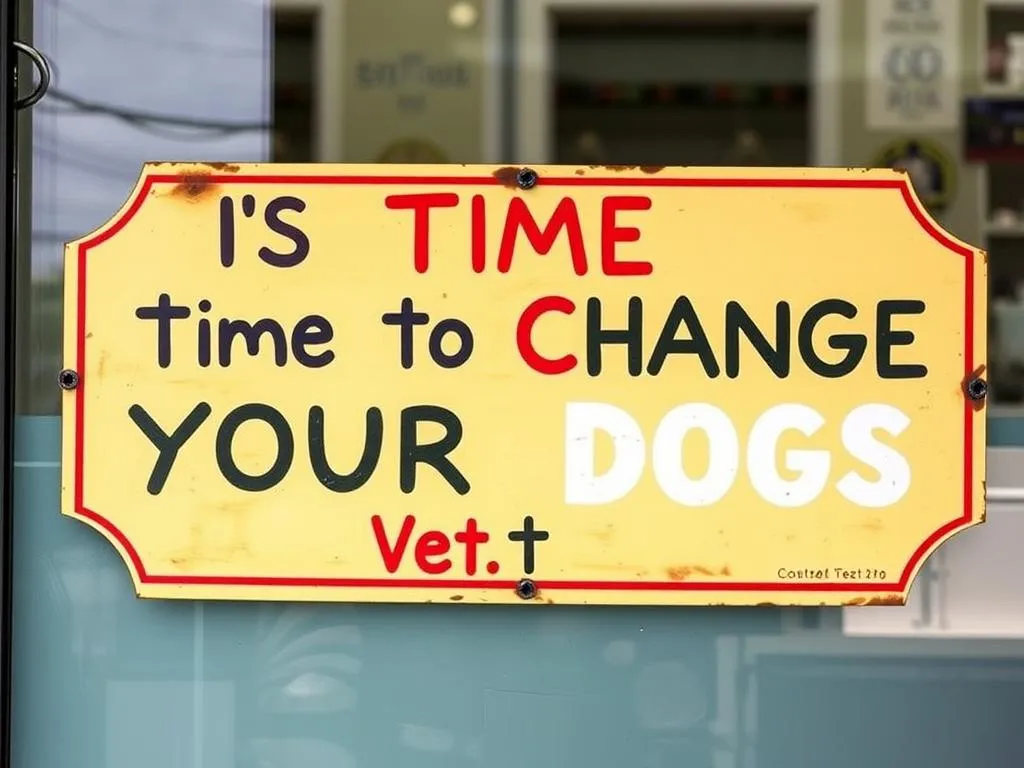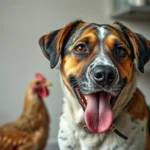
Introduction
Good nutrition is paramount for our canine companions, influencing their health, energy levels, and overall well-being. As a dog owner, understanding the dietary needs of your pet and recognizing when those needs change is crucial for their longevity and happiness.
In this guide, we will discuss signs it’s time to change your dog’s food vet answer, helping you identify when it may be necessary to adjust your dog’s diet based on various physiological and behavioral signs.
Understanding Canine Nutrition
The Role of Nutrition in Dog Health
Proper nutrition is the cornerstone of a dog’s health. Essential nutrients include:
- Proteins: Vital for growth, muscle development, and tissue repair.
- Fats: Provide energy and support skin and coat health.
- Carbohydrates: Serve as a source of energy and aid in digestive health.
- Vitamins and Minerals: Crucial for various bodily functions, including immunity and bone health.
Each nutrient plays a unique role, and a balanced diet is critical for maintaining your dog’s health.
Different Types of Dog Food
When it comes to dog food, there are various options available, each with its pros and cons:
- Kibble: Convenient and shelf-stable, but quality can vary. Look for high-quality brands with good ingredients.
- Wet Food: More palatable for picky eaters, but can be more expensive and less convenient.
- Raw Diets: Advocates argue for natural diets, but it requires careful handling and balance.
- Homemade Diets: Allows for complete control over ingredients, but necessitates nutritional knowledge to ensure completeness.
Understanding these options can help you make informed decisions about your dog’s diet.
Signs That Indicate a Change in Diet is Necessary
Physical Signs
Weight Changes
One of the most noticeable signs it’s time to change your dog’s food vet answer is weight fluctuation. If your dog is losing weight unexpectedly, it could indicate inadequate nutrition or an underlying health issue. Conversely, unexpected weight gain may suggest that your dog’s food is too calorie-dense or that they aren’t getting enough exercise.
Coat Condition
A shiny, healthy coat is often a reflection of good nutrition. If your dog’s fur appears dull, brittle, or is shedding excessively, this could signal nutritional deficiencies. A change in diet may be necessary to provide the essential fatty acids and proteins your dog needs for a vibrant coat.
Skin Issues
Skin problems such as rashes, itching, or allergies can also be indicators that it’s time to reconsider your dog’s food. Many dogs suffer from food allergies that manifest as skin irritations. Identifying the right diet can alleviate these symptoms.
Behavioral Signs
Changes in Energy Levels
If you notice your dog becoming lethargic or hyperactive, this could be linked to their food. A diet lacking in essential nutrients may lead to low energy levels, while an overly rich diet could make your dog more excitable. Monitoring their energy can provide clues about their nutritional needs.
Digestive Issues
Digestive problems such as diarrhea, vomiting, or constipation are clear signs that something is off with your dog’s diet. These symptoms may arise from food intolerances, poor-quality ingredients, or an abrupt diet change. Observing your dog’s digestive health is essential for making dietary adjustments.
Food Preferences
A sudden disinterest in food or picky eating habits can be a signal that your dog requires a different diet. If your dog frequently turns away from their food, it may not be meeting their taste or nutritional needs.
Age and Life Stage Considerations
Puppy Nutrition
Puppies have unique nutritional requirements that differ from adult dogs. They need higher protein and fat levels to support their growth and development. Signs that your puppy may need a dietary change include poor weight gain or stunted growth, which could indicate that their current food isn’t providing sufficient calories or nutrients.
Adult Dogs
As dogs mature, their dietary needs evolve. An adult dog requires a balanced diet to maintain their health. If you notice changes in your dog’s weight, energy, or coat condition, it could be time to switch to a food formulated for adult dogs or to a different brand that better meets their needs.
Senior Dogs
Senior dogs often require different nutrition due to age-related health issues. Lower calorie and higher fiber diets may be beneficial as their metabolism slows. Signs that an older dog may need a diet change include joint stiffness, dental issues, or digestive problems. Monitoring these signs can help you provide the best nutrition for your aging pet.
Health Conditions and Dietary Needs
Common Health Issues
Allergies and Sensitivities
Food allergies can lead to a variety of health issues, including skin irritations and gastrointestinal problems. If your dog shows signs of allergies, such as itching or frequent ear infections, it may be time to consult your vet about an elimination diet to identify potential allergens.
Obesity and Weight Management
Obesity is a growing concern in dogs and can lead to serious health problems. If your dog is overweight, it’s essential to create a diet plan that promotes gradual weight loss while ensuring they receive all necessary nutrients. Your vet can provide tailored advice based on your dog’s specific needs.
Chronic Conditions
Dogs with chronic conditions like diabetes or kidney disease often require specialized diets. Recognizing the signs of these conditions, such as increased thirst, frequent urination, or lethargy, can prompt a necessary dietary change. Consult with your veterinarian for the best dietary approach for managing these conditions.
Consulting with Your Veterinarian
Importance of Professional Guidance
Before making significant dietary changes, consulting with your veterinarian is always advisable. They can assess your dog’s health, identify any underlying issues, and recommend the best food options tailored to your dog’s specific needs.
Questions to Ask Your Veterinarian
Here are some suggested questions to discuss with your vet regarding diet changes:
- What signs should I look for that indicate a dietary change is necessary?
- Are there specific food brands or types you recommend for my dog’s age and health condition?
- How should I transition my dog to a new food?
- What should I do if my dog has specific food sensitivities or allergies?
Transitioning to a New Dog Food
Steps for Transitioning
Transitioning your dog to a new food should be done gradually to prevent digestive upset. Here’s a step-by-step guide:
- Start with a Mix: Begin by mixing a small amount of the new food with the current food, gradually increasing the proportion of the new food over 7-10 days.
- Monitor Their Response: Keep an eye on your dog’s stool and overall behavior during the transition. Any signs of digestive discomfort should prompt you to slow the transition process.
- Stay Consistent: Stick with the new diet for at least a few weeks to see how your dog adjusts before considering further changes.
Monitoring Your Dog’s Response
During the transition, watch for signs of digestive issues, changes in energy levels, or alterations in coat condition. If your dog experiences any adverse reactions, consult your veterinarian for advice.
Conclusion
Recognizing the signs it’s time to change your dog’s food vet answer is essential for maintaining your dog’s health and happiness. From physical signs like weight changes and coat condition to behavioral indicators such as energy levels and food preferences, being aware of your dog’s needs can help you provide the best nutrition possible.
Regular check-ups with your veterinarian and staying informed about your dog’s nutritional requirements are crucial for their ongoing health. Don’t hesitate to take action if you notice any of the signs discussed here; consulting your vet for personalized advice is the best course of action for your furry friend.









